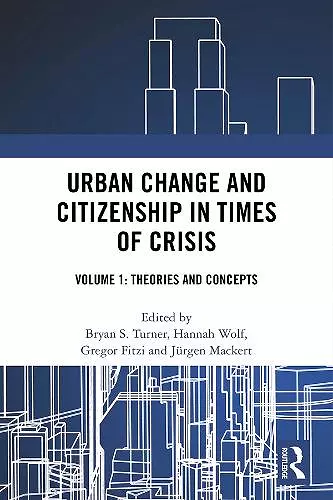Urban Change and Citizenship in Times of Crisis
Volume 1: Theories and Concepts
Bryan S Turner editor Jürgen Mackert editor Gregor Fitzi editor Hannah Wolf editor
Format:Hardback
Publisher:Taylor & Francis Ltd
Published:24th Mar '20
Should be back in stock very soon
This hardback is available in another edition too:
- Paperback£41.99(9781032172934)

Urban Change and Citizenship in Times of Crisis addresses the fact that in the beginning of the twenty-first century the majority of the world’s population is urbanised, a social fact that has turned cities more than ever into focal sites of social change. Multiple economic and political strategies, employed by a variety of individual and collective actors, on a number of scales, constitute cities as contested spaces that hold opportunities as well as restrictions for their inhabitants. While cities and urban spaces have long been of central concern for the social sciences, today, classical sociological questions about the city acquire new meaning: Can cities be spaces of emancipation, or does life in the modern city entail a corrosion of citizenship rights? Is the city the focus of societal transformation processes, or do urban environments lose importance in shaping social reality and economic relationships? Furthermore, new questions urgently need to be asked: What is the impact of different historical phenomena such as neo-liberal restructuring, financial and economic crises, or migration flows, as well as their respective counter-movements, on the structure of contemporary cities and on the citizenship rights of city inhabitants? The three volumes address such crucial questions thereby opening up new spaces of debate on both the city and new developments of urbanism.
The contributions to Theories and Concepts offer new theoretical reflections on the city in a philosophical and historical perspective as well as fresh empirical analyses of social life in urban contexts. Chapters not only critically revisit classical and modern philosophical considerations about the nature of cities but no less discuss normative philosophical reflections of urban life and the role of religion in historical processes of the emergence of cities. Composed around the question whether there can be such a thing as a ‘successful city’, this volume addresses issues of urban political subjectivities by considering the city’s role in historical processes of emancipation, the fight for citizenship rights, and today’s challenges and opportunities with regard to promoting social justice, integration, and diversity. Consequentially, theory-driven empirical analyses offer new insight into ways of solving problems in urban contexts and a genuine approach to analyse the Social Quality in cities.
"What makes a ‘good’ city? How may the quality of cities be characterized and defined? For years I’ve been wondering why these questions are not on the agenda. This volume covers, for the first time, theoretical, historical and political aspects in an attempt to scrutinize the basis of a successful city. Innovative approaches combine issues of quality with the concern for collectivity under conditions of social change. This book is an essential read for sociologists, and students and scholars with a focus on urban studies, urban policies, planning or design studies."
Martina Löw, Professor of Planning and Architecture, Institute of Sociology, Technical University Berlin, Germany
"Never has it been more important to explore the nature of urban change and related issues of social and environmental justice. [...] Through the lens of multiple identities, social fragmentation, and fragile institutions the authors, individually and collectively, demonstrate that urbanisation may advance certain freedoms while simultaneously impinging adversely on established civil and political rights. [...] Urbanisation is essentially an uneven process, spatially and temporally, and the chapters capture these divergent trajectories across different cultures. Whether these 'Times of Crisis' are greater than other times the reader must be the judge. Either way, these are stimulating, challenging essays anchored in original research."
Richard Rodger, Emeritus Professor of Economic and Social History, University of Edinburgh, and Fellow of the Academy of Social Sciences, UK
ISBN: 9780367205621
Dimensions: unknown
Weight: 439g
194 pages